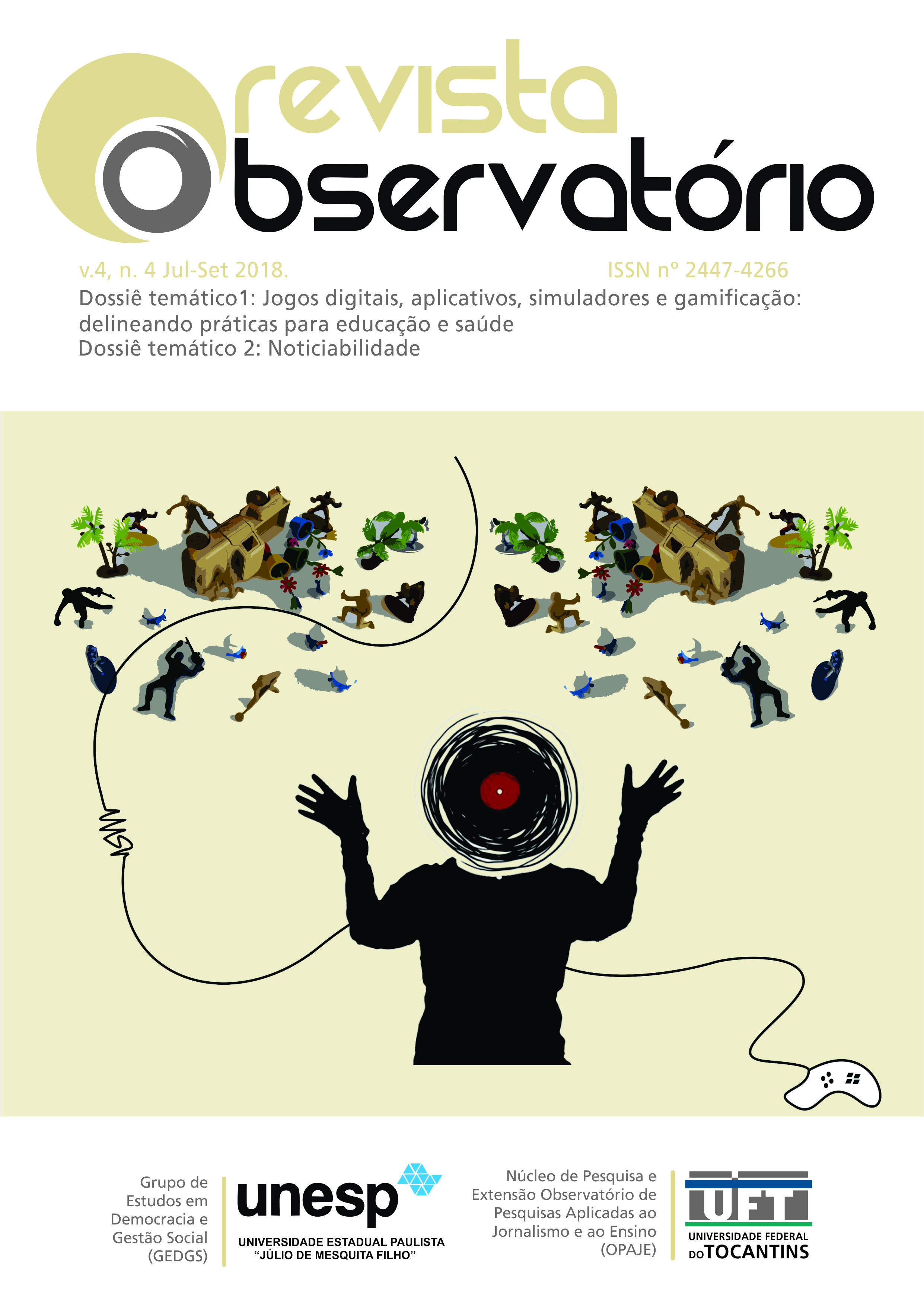“WHO LEFT IT HERE?!”: Procedural rhetoric and participation in the development of a health game
DOI:
https://doi.org/10.20873/uft.2447-4266.2018v4n4p75Keywords:
serious game, health communication, intoxication, games and health, collective healthAbstract
This work explores the approach of procedural rhetoric and the concept of games as participation applied to a serious game focused on health communication. From the experience of the development of the game "Who Left It Here?!", focused on raising parent awareness about the risks of domestic poisoning in children, we present procedural rhetoric as a way of building meaning in digital games allied to the domains of player participation, describing how such theoretical concepts impact the aesthetic, textual, technical and procedural aspects of a health communication game.
Downloads
References
global games market report: trends, insights, and projections toward 2020. Relatório de pesquisa. Amsterdam: Newzoo, 2017. Disponível em: < https://newzoo.com/insights/trend-reports/newzoo-global-games-market-report-2017-light-version/ >. Acesso em: 28 ago. 2017.
ARAUJO, I. S.; CARDOSO, J. M. Comunicação e Saúde. Rio de Janeiro: Editora Fiocruz, 2007.
BOGOST, I. Persuasive Games: The Expressive Power of Videogames. Kindle edition. Cambridge: The MIT Press, 2007.
ESTATÍSTICA anual de casos de intoxicação e envenenamento. Relatório de pesquisa. Rio de Janeiro: SINITOX (Sistema Nacional de Informações Tóxico-Farmacológicas), Instituto de Comunicação e Informação Científica e Tecnológica em Saúde (Icict), Fundação Oswaldo Cruz (Fiocruz), 2015. Disponível em: < www.sinitox.icict.fiocruz.br >. Acesso em: 15 abr. 2015.
FERRARI, S. The Judgement of Procedural Rhetoric. Orientador: BOGOST, I. Atlanta: Georgia Institute of Technology, 2010. 129 f. Dissertação de mestrado
GEE, J. P.; SHAFFER, D. W. Before Every Child Is Left Behind: How Epistemic Games Can Solve the Coming Crisis in Education. Relatório de pesquisa. Madison (WI), EUA: Wisconsin Center for Education Research, 2005. Disponível em: < http://www.wcer.wisc.edu/publications/workingPapers/Working_Paper_No_2005_7.pdf >. Acesso em: 20 mar. 2013.
Growth of gaming in 2007 far outpaces movies, music. Ars Technica, 2008. Disponível em: < http://arstechnica.com/gaming/news/2008/01/growth-of-gaming-in-2007-far-outpaces-movies-music.ars >. Acesso em: 07 jan. 2010.
HALL, S. Encoding/decoding. In: HALL, S.; HOBSON, D., et al (Eds.). Culture, Media, Language: Working Papers in Cultural Studies, 1972–79. London: Routledge, 2005. p.117-127.
JENKINS, H. et al. Confronting the challenges of participatory culture: media education for the 21st century. Relatório de pesquisa. MacArthur Foundation, 2006. Disponível em: < http://www.digitallearning.macfound.org/atf/cf/%7B7E45C7E0-A3E0-4B89-AC9C-E807E1B0AE4E%7D/JENKINS_WHITE_PAPER.PDF >. Acesso em: 14 jan. 2013.
JOHNSTON, C. “I am no man”: For Zelda-playing daughter, dad gives Link a sex change. Ars Technica, 2012. Disponível em: < http://arstechnica.com/gaming/2012/11/i-am-no-man-for-zelda-playing-daughter-dad-gives-link-a-sex-change/ >. Acesso em: 20 nov. 2012.
MARTÍN-BARBERO, J. Communication, Culture and Hegemony: From the Media to Mediations. London: Sage Publications, 1993.
MICHAEL, D.; CHEN, S. Serious Games: Games That Educate, Train, and Inform. Boston: Thomson Course Technology, 2006.
MONTEIRO, S.; VARGAS, E. P.; CRUZ, M. Desenvolvimento e uso de tecnologias educacionais no contexto da Aids e da saúde reprodutiva: reflexões e perspectivas. In: MONTEIRO, S.; VARGAS, E. (Eds.). Educação, Comunicação e Tecnologia Educacional: interfaces com o campo da saúde. Rio de Janeiro: Editora Fiocruz, 2006. p.27-34.
Pesquisa Game Brasil 2017. Relatório de pesquisa.2017. Disponível em: < https://www.pesquisagamebrasil.com.br/ >.
PRENSKY, M. Digital Game-Based Learning. New York: McGraw-Hill 2004.
RAESSENS, J. Computer games as participatory media culture. In: RAESSENS, J.; GOLDSTEIN, J. (Eds.). Handbook of Computer Game Studies. Cambridge, MA: The Mit Press, 2005. p.p. 373-389.
______. Playful Identities, or the Ludification of Culture. Games and Culture, v. 1, n. 52, p. 52-57, 2006. Disponível em: <http://gac.sagepub.com/content/1/1/52>.
______. A Taste of Life as a Refugee: How Serious Games Frame Refugee Issues. In: SKARTVEIT, H.-L.; GOODNOW, K. (Eds.). Changes in Museum Practice: New Media, Refugees and Participation. New York / Oxford: Berghahn Books, 2010. p.94-105.
RATAN, R.; RITTERFELD, U. Classifying serious games. In: RITTERFELD, U.; CODY, M., et al (Eds.). Serious Games: Mechanisms and effects. London: Routledge, 2009. p.10-24.
RITTERFELD, U.; CODY, M.; VORDERER, P. (Eds.) Serious Games: Mechanisms and effects. London: Routledge. 2009.
SCHÄFER, M. T. Bastard Culture! User participation and the extension of cultural industries. Orientador: KESSLER, P. D. F. E. Utrecht: Research Institute for Culture and History, Utrecht University, 2008. 331 f. (PhD).
SICART, M. Against Procedurality. Game Studies, v. 11, n. 3, 2012. Disponível em: .
Trends and insights on games and interactive media 2017. Relatório de pesquisa. New York: SuperData Research, 2017. Disponível em: < https://www.superdataresearch.com/market-data/market-brief-year-in-review/ >. Acesso em: 28 ago. 2017.
VASCONCELLOS, M. S. Comunicação e Saúde em Jogo: os video games como estratégia de promoção da saúde Orientador: ARAUJO, I. S.; RAESSENS, J. Rio de Janeiro: Instituto de Comunicação e Informação Científica e Tecnológica em Saúde (Icict), Fundação Oswaldo Cruz, 2013. 293 f. Tese de (Doutorado).
VASCONCELLOS, M. S.; CARVALHO, F. G.; ARAUJO, I. S. Understanding Games as Participation: an analytical model. Cibertextualidades, n. 8, p. 107-118, 2017. ISSN 1646-4435. 8 (2017) 105-118.Disponível em: <http://hdl.handle.net/10284/6012>.
VASCONCELLOS, M. S. et al. A Saúde na Literatura Acadêmica sobre Jogos: uma análise das publicações do SBGames. In: Proceedings do XV Simpósio Brasileiro de Jogos e Entretenimento Digital — SBGames, 2016, São Paulo. SBC, 2016. p. 1062-1070.Disponível em: <http://www.sbgames.org/sbgames2016/downloads/anais/157759.pdf>.
Downloads
Published
How to Cite
Issue
Section
License
[PT] Autores que publicam nesta revista concordam com os seguintes termos:
1. Autores mantém os direitos autorais e concedem à revista, sem pagamento, o direito de primeira publicação, com o trabalho simultaneamente licenciado sob a Creative Commons Attribution License (CC BY-NC 4.0), permitindo o compartilhamento do trabalho com reconhecimento da autoria do trabalho e publicação inicial nesta revista.
Leia todos os termos dos direitos autorais aqui.

